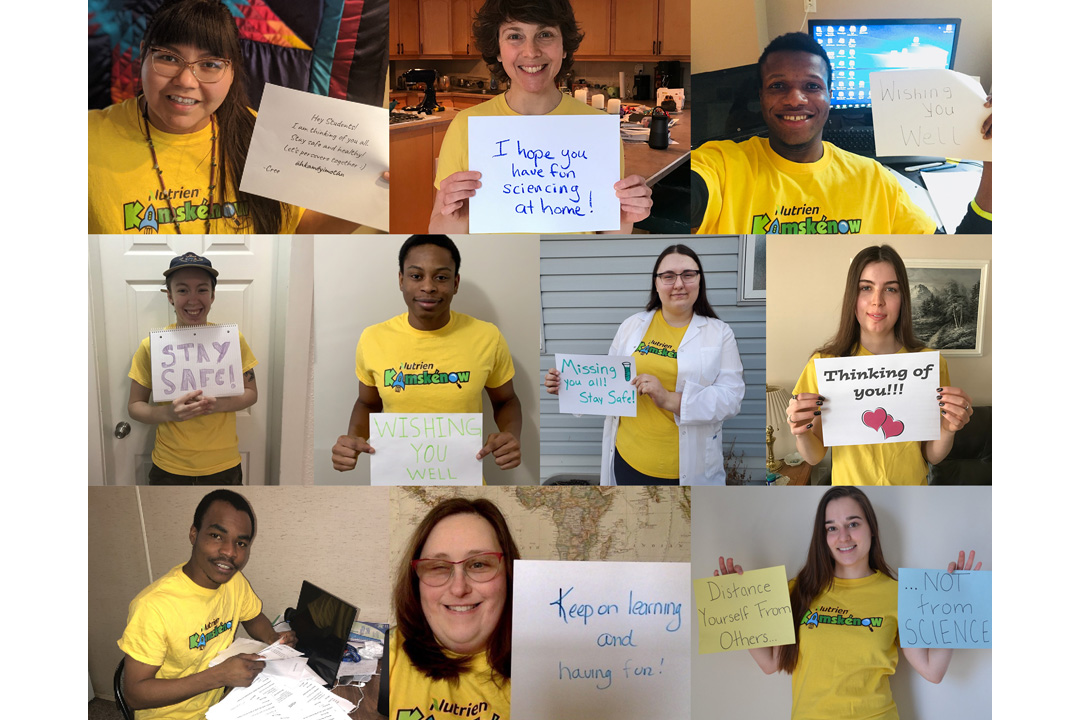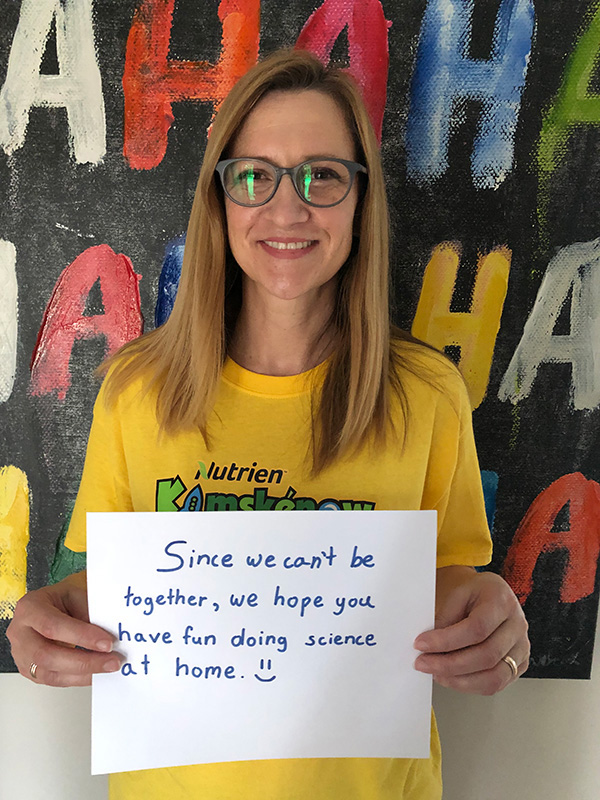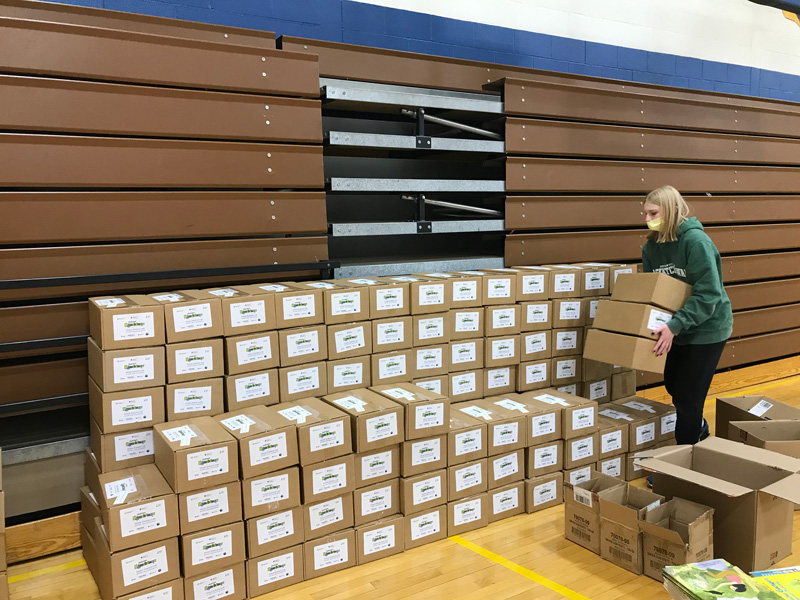
USask unites: Nutrien Kamskénow program provides 700 home science kits to Saskatoon schoolchildren
Since the first cases of COVID-19 were announced in the province, members of the USask community have come together to support one another in these uncertain times.
By Shannon BoklaschukExtraordinary circumstances have brought out extraordinary responses from members of our USask community. From frontline health-care workers to researchers looking for a solution to this global health threat, there are so many stories about people are working to make our home communities safer and healthy. Here are a few of the inspiring stories of our students, staff, faculty and alumni.
When the COVID-19 pandemic forced the cancellation of the College of Arts and Science’s in-person Nutrien Kamskénow programming, the college’s Science Outreach team wanted to ensure Saskatoon schoolchildren could still explore science at home.
As a result, during the week of April 27, the team delivered 700 home science kits to the city’s public and Catholic school divisions.
“Our regular face-to-face Nutrien Kamskénow program came to such an abrupt end when everyone went home due to COVID-19. It was just so sad,” said Lana Elias, Director of Science Outreach in the College of Arts and Science at the University of Saskatchewan (USask).

“Our USask science student instructors had built relationships with kids over the nine weeks prior and didn’t get to finish the program and welcome kids to campus. We wanted to find a way to continue to employ our students, support teachers and inspire kids. Thanks to a great Science Outreach team and our sponsors and donors, who agreed to continue to support a kit version of the program, we were able to make this come together.”
One of the main objectives of Nutrien Kamskénow is to encourage Indigenous students—who are underrepresented in scientific fields—to consider further education and careers in the sciences. The program is offered at no cost to Grade 4-11 community school classrooms in Saskatoon.
Unlike other science outreach programs that offer one-time visits, Nutrien Kamskénow provides the same students with weekly instruction in their own classrooms during a 13-week period. For 90 minutes each week, participants learn through fun activities such as building balloon rockets, programming robots, simulating earthquakes and growing crystals.
Prior to the cancellation of in-person classroom instruction at USask and in Saskatoon’s K-12 schools, the Nutrien Kamskénow instructors—energetic USask students who want to share their passion for science with kids—had been working with about 600 local children each week.
Elias said she was very impressed with how the Science Outreach team adapted its programming in light of the pandemic and came up with fun ideas that are now included in the home science kits.
“We have designed two levels of kits and each has nine or 10 activities. They include activities like magic sand, making a UV detector, learning about chromatography, making an orb levitate, experimenting with a greenhouse, learning about inertia and the tablecloth trick, designing a Rube Goldberg device and so much more,” Elias said, adding that her team also created TikTok videos to help explain the scientific concepts to the kids and to complement the contents of the kits.
“Nutrien Kamskénow is normally a face-to-face program that is offered to schools in lower-income neighborhoods. We know that not all kids we work with have easy access to online learning materials or access to materials needed to try some of the experiment ideas being shared online, through social media or passed along by friends. This is a great way that anyone can have fun doing science experiments at home together with loved ones.”
The public and Catholic school divisions were pleased to receive the science kits, said Elias.

“Thank you to Nutrien Kamskénow Science Outreach program for continuing to support Saskatoon public school students in their learning from home,” said Saskatoon Public Schools Superintendent Brent Hills. “We are thankful that our partners in education have assembled these home edition kits to spark our students’ imagination and creativity with hands-on science experiments.”
“The hands-on aspect of the Nutrien Kamskénow Science Outreach program is really key to its success engaging students,” said Greater Saskatoon Catholic Schools Board Chair Diane Boyko. “The take-home science kits are a wonderful way to fill the learning gap that was left when in-person classes were indefinitely suspended. We’re very thankful for this partnership with Nutrien and the (USask) College of Arts and Science.”
Elias said the global COVID-19 pandemic is exemplifying the importance of science and math literacy, with scientific information and mathematical modelling now being presented to the public on a daily basis by experts and news media.
“Moving forward, when math students ask ‘why do we need to learn this?’, it will be fairly easy for teachers to use this pandemic as an example of the value of mathematical literacy,” said Elias. “Mathematical modelling helps us make the best decisions and save lives. Getting kids excited about learning science and math now is timely and empowering.”
As for Nutrien Kamskénow, Elias describes the program as a “win-win-win” situation for all involved. USask students, for example, gain presentation and teaching experience. As they share their science expertise, they also learn cultural competencies as well as gain valuable experience supporting their community. Teachers in the Catholic and public school divisions benefit from seeing new activity ideas and different ways of teaching science. Young schoolchildren, meanwhile, have the opportunity to see firsthand how exciting and engaging science can be.
“By getting kids excited about science early, we increase the chances that they stick with it. The long-term goal is to increase the number of Indigenous people in the sciences, and Nutrien Kamskénow is one way to do that,” Elias said.
“In order to continue to advance a growing world, we need to ensure everyone is able to contribute to achieving our shared goals. Through programs like Nutrien Kamskénow, we can help to engage, excite and inspire Indigenous youth so they see themselves with a future in the sciences contributing to a more sustainable world for everyone,” said Lisa Mooney, Global Lead, Sustainability and Strategic Inclusion at Nutrien.
Nutrien Kamskénow celebrated its 10th anniversary in 2019. Numerous sponsors support the popular program, including the College of Arts and Science; USask; Nutrien; the Natural Sciences and Engineering Research Council (NSERC) PromoScience program; the Community Initiatives Fund; and the NSERC Chair for Women in Science and Engineering (Prairies).
Share your stories with us: We are collecting the stories of resilience and good spirit from our USask community. Please send story ideas and photos to news@usask.ca.
As a community it is critical that we support each other and remain respectful during what is a difficult time for all of us. Please follow all guidelines and take all precautions to prevent the further spread of COVID-19 in our community.
How you can help our students during the COVID-19 pandemic: https://alumni.usask.ca/news/2020/covid-19-how-you-can-help-our-students.php
For the latest developments and information about the University of Saskatchewan's response to COVID-19, please go to www.usask.ca/updates.
The University of Saskatchewan is undertaking critical research and contributing to global efforts to combat COVID-19. The University of Saskatchewan's Vaccine and Infectious Disease Organization (VIDO-InterVac) is a world leader in developing vaccines and technologies to combat infectious diseases. Your support of the COVID-19 Research Fund supports the increased efforts of researchers at the University of Saskatchewan to develop vaccines and treatments for COVID-19. Donate now.

